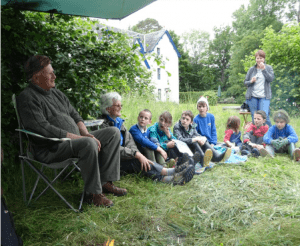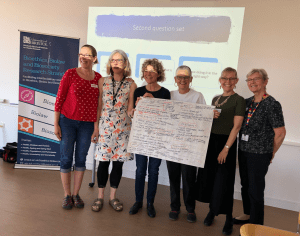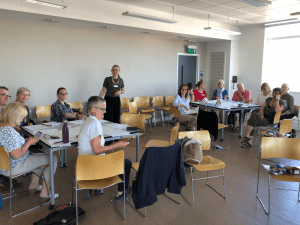On 5th June 2019, the Ageing and the Life Course Faculty Research Group (University of Bristol) organised a series of events on Intergenerational Relations, including presentations, panel discussions, a keynote speech and networking activities. The events brought together a cross-disciplinary research team of academics from across the Faculty of Social Sciences and Law, Faculty of Engineering and Faculty of Health Sciences of the University of Bristol, as well as external collaborators and Invited speakers: Simon Biggs (Melbourne University), Ann-Kristin Boström (Jönköping University), Gregory Mannion (University of Stirling) and Robert Vanderbeck (University of Leeds).
In the morning a series of presentations and discussions took place. These included:
- Karen West and Helen Manchester–‘Intergenerational futures in an era of radical uncertainty’.
As co-leads of this inter-disciplinary group, Karen and Helen presented some preliminary thoughts on the development of intergenerational relations as an ‘inter-discipline’ and an outline inter-disciplinary research agenda. - Robert Vanderbeck– ‘Intergenerational Method and Practice:
Reflections from INTERSECTION’.
Drawing from a multinational collaborative project INTERSECTION: Intergenerational Justice, Consumption, and Sustainability in Comparative Perspective, Robert focused on issues of both method and practice in relation to contemporary intergenerational relationships. He provided examples and reflections concerning how to research and understand the nature of generational relationships (whether within or beyond families), how to promote improved intergenerational relationships, and how to address broader social and environmental challenges with intergenerational practice. - Ann-Kristin Böstrom– ‘Intergenerational relationships: concept, history and context’.
Ann-Kristin drew on her extensive knowledge and experience of UNESCO-funded European and international networks to reflect on global developments in research on intergenerational programs and intergenerational learning. Her presentation highlighted important differences in perspective on intergenerational solidarity and practice in rural and urban settings. - Greg Mannion– ‘Assembling Intergenerational Arenas for Learning and Education’.
Greg’s presentation presented findings from two intergenerational programs in learning and education in Scotland: Stories in the Land- on the Tracks of the Highland Drovers, and the Storytribe, each of which involved multi-generational groups with backgrounds in storytelling, singing, art, geography, history and drama. From these examples, Greg offered interesting theoretical insights into processes of intergenerational learning, why and how to generate new intergenerational meanings, practices and arenas.

Following these introductory presentations, a panel discussion explored the further development of an interdisciplinary research programme in relation to Intergenerational Relationships. Discussions focused on conceptual frameworks, and in particular the notion of Generational Intelligence as an organising concept, the interconnections between different disciplines and research domains, possible methodological innovations, and potential work packages.
This workshop was followed by a public event, in which Simon Biggs gave a public lecture on the theme of ‘Negotiating Intergenerational Relations in a Changing Demographic Landscape’. In his keynote, Simon addressed his Generational Intelligence approach to understanding and advancing age relations in the context of demographic change. He suggested that cultural adaptation to a longer life and the so-called ‘rectangularisation’ of the population has been slow to move beyond settled ideas of conflict, solidarity, ambivalence and continuity. A number of tensions were examined: between positive and negative forms of discontinuity, positive forms of othering, within-age and between-age thinking, and, present and lifecourse centred perspectives. Simon argued that a key element to achieving a sustainable generational settlement and to future-proofing policy and other initiatives from an intergenerational perspective, lies in the development of capacities to put oneself in the place of ‘the age-other’. Simon’s lecture, together with the interventions of Ann-Kristin Boström and Gregory Mannion stimulated lively discussions with the audience, comprised of academics, practitioners and policy makers, about generational differences and what demographic change means for younger and older generations and for the future of intergenerational relations.
The event was attended by a range of key organisations, including the International Longevity Centre UK (ILC), the Housing Learning and Improvement Network and The Care Forum, as well as members of the public and academics. We are grateful to all participants who contributed to these events and we look forward to working further to develop an exciting interdisciplinary research agenda together with these partners in the future.
We would love to hear your feedback and interests in collaboration in the field of intergenerational relations, please email Karen.west@bristol.ac.uk or Helen.manchester@bristol.ac.uk.


